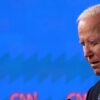This week, two seemingly unconnected events took place in Moscow. Yet, considered together, they have are of tremendous importance and serve to weaken the rule of law in Russia.
Last Tuesday, imprisoned former Russian oil tycoon Mikhail Khodorkovsky delivered a passionate speech at the end of his kangeroo court proceedings about the corroding lawlessness plaguing his country. As Khodorkovsky addressed the court, masked Russian police SWAT teams armed with Kalashnikovs raided the National Reserve Bank in Moscow. The bank belongs to Alexander Lebedev, another billionaire political opponent of the Putin-Medvedev “tandemocracy.”
The Daily Signal depends on the support of readers like you. Donate now
According to international media reports, the businessman left Russia right after the raid. He may have done the right thing: when Khodorkovsky refused to leave, he ended up with two prosecutions for a combined requested sentence of 23 years in the GULAG. Other businessmen targeted by the state left the country—and also kept their freedom.
After the bank invasion its managers said that the investigators did not make it clear what they were looking for, but they accessed computer files and records. The agents from Russia’s FSB secret service and the interior ministry said that the search was related to the bank’s takeover of another Russian financial institution, Rossiysky Kapital. Nevertheless, the search looks more like a personal warning to Lebedev, and was reminiscent of the 1990s, when Russian authorities and competing business owners abused such raids to threaten their opponents and rivals.
Mr. Lebedev owns three British newspapers, but more importantly, he publishes the best opposition Russian investigative paper, Novaya Gazeta, which employed the journalist Anna Politkovskaya. Anna’s 2006 murder is still unsolved. Several other Novaya Gazeta editors and journalists were also murdered.
Lebedev also owns interest in the Russian airline Aeroflot, and the country’s largest potato producer. However, it is Lebedev’s politics and media involvement which are more likely to have triggered a goon raid, not his other business interests: Just a few hours before the raid, Novaya Gazeta published the first interview with Khodorkovsky and his imprisoned business partner Platon Lebedev (no relation).
And two years ago, Lebedev’s tabloid was abruptly shut down after it published a story claiming Vladimir Putin’s marriage was on the rocks and that then Russian president was involved in a romantic relationship with 27-year-old Olympic champion Alina Kabayeva.
Lebedev is also a politically active: In 2008, while a Duma deputy, he tried to form a new oppositional party together with the ex-Soviet leader Mikhail Gorbachev. The Kremlin blocked the attempt, and Lebedev and Gorbachev got nowhere.
When the Moscow mayor Luzhkov was fired by president Medvedev, Lebedev claimed publicly that Moscow should be the model for the rest of Russia, electing its mayors and governors instead of having the President appointing them like in czarist times.
A former KGB foreign intelligence officer (he served in London in the late 1980s), Lebedev also criticized the ex-mayor of Moscow Yuri Luzhkov, and his wife Yelena Baturina for the wide-spread allegations of multi-billion dollar corruption. He recently called for Britain to investigate Luzhkov, who may seek asylum in London.
Now, Lebedev believes that the recently fired mayor may have ordered the raid. At the same time, it is obvious that the Kremlin may have its reasons to dislike Lebedev, especially with the looming 2011 Duma elections—not to mention the 2012 presidential elections. His partner, Gorbachev, recently announced that if the government policies don’t change, Russia will have a social explosion by 2015.
Thus the raid on the National Reserve Bank was possibly caused by a combination of its owner’s political and media activities which crossed the paths of powerful clans in Russia. Wealthy businessmen, who think for themselves and act independently, are particularly dangerous for the regime, as they compete with the Kremlin for power and popularity.
Will Lebedev’s fate be the same as Khodorkovsky’s? Or he will leave Russia and end up in London, like another exiled oligarch, Boris Berezovsky?
Meanwhile, the Kremlin knows that this latest scandal may spoil the business climate in Russia and scare off foreign investors. But, with oil prices continuing to climb, it seems not to care.
The Obama Administration and the U.S. business community should keep an eye on extra-legal activities of the Russian authorities, businesses, and organized crime, especially when considering Russia’s membership in the WTO. While the development of bilateral U.S.-Russia economic ties and Russia’s integration into the global economy are laudable, we should not ignore blatant violations of accepted business practices and democratic norms by corrupt elements of the Russian government and law enforcement.






























